Herbal Allergy Tea Recipe for Relief
Feeling those itchy eyes and raspy cough? Runny nose and sneezing non-stop? It’s allergy season and you are not alone in your suffering. Around 100 million people experience allergies in the U.S. alone! If you are looking for a natural way to ease the symptoms, you are in the right spot. This herbal allergy tea recipe will help relieve your allergy symptoms with just a few cups a day. This blend is a perfect mix of herbs that heal and taste good too!
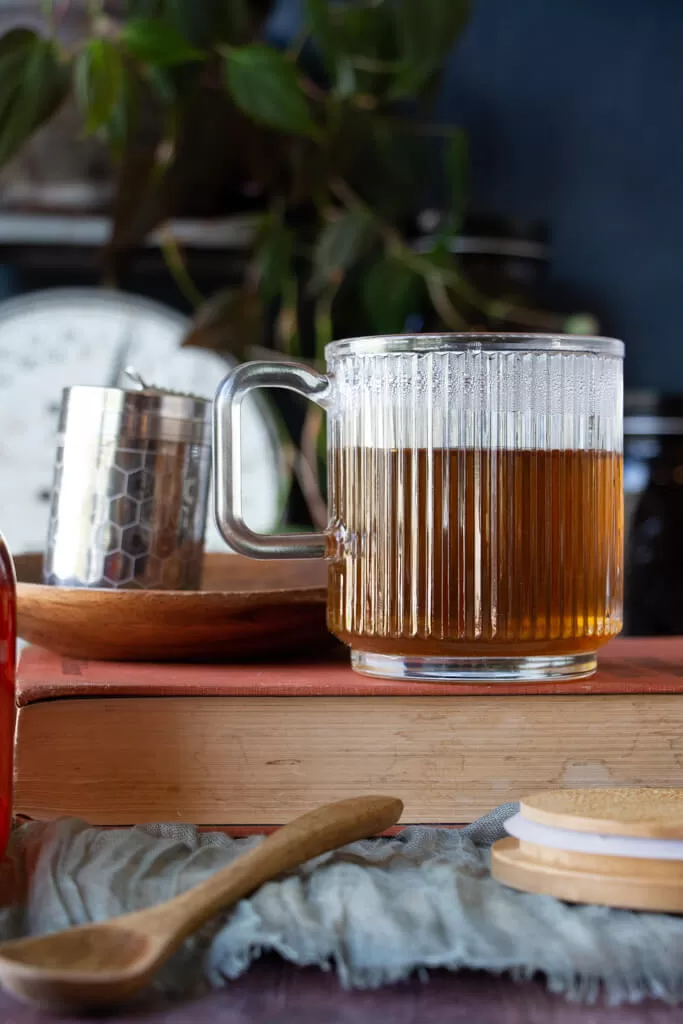
Seasonal allergies, also known as allergic rhinitis or hay fever, are common allergic reactions to airborne substances such as pollen, mold, and animal dander.
The symptoms of seasonal allergies can vary from person to person, but some common symptoms are sneezing, runny or stuffy nose, nasal congestion, itchy watery eyes, scratchy sore throat, coughing, fatigue, headache, and ear congestion.
This allergy relief recipe was specially blended (by me!) to help ease these symptoms. Of course, there are also other types of teas to help with allergies. These are just a few of my personal favorite herbs in a special healing blend!
Medical disclaimer: I am not a medical professional and I am not claiming that these herbs are a substitute for professional care. Always consult a professional for medical advice when starting natural remedies at home. These are just things that I use and love in my own home.
Herbal Allergy Tea Recipe
My favorite place to buy herbs online is Starwest Botanicals. Each of the links below is an affiliate link, where I make a small commission from your purchase, at no additional cost to you.
Ingredients:

Don’t have all these herbs? That is okay! Try a few at a time and create your own unique blend! A ginger tea or peppermint tea on their own can help ease some symptoms!
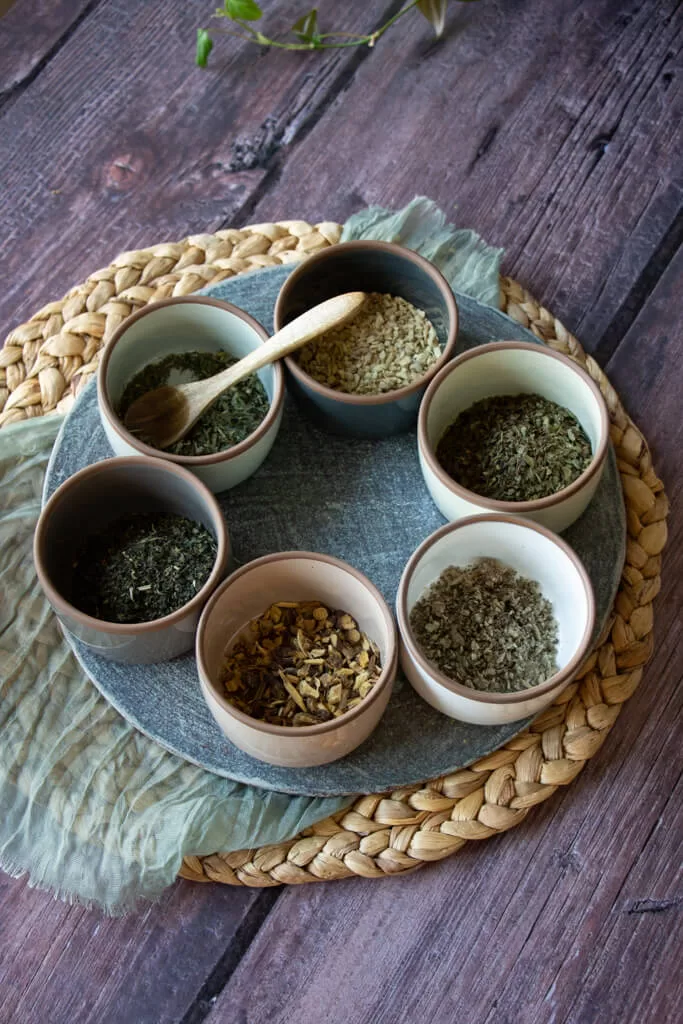
Optional additions: Adding local raw honey and lemon to the tea can help to enhance the flavor and provide additional health benefits. Honey is a natural antibacterial and can help to soothe a sore throat, and lemon is rich in vitamin C and can help to boost the immune system.

As an Amazon Associate, I earn from qualifying purchases. Please visit my privacy + disclosure page for more details.
Supplies:
How to Brew Herbal Tea
For detailed instructions on the methods for brewing herbal tea, check out my post: How to Brew Herbal Tea: Infusions and Decoctions.
Instructions:
- In a mixing bowl, combine all the dried herbs and stir to mix well. Store in your half-pint jar.
- Measure out 2 tablespoons of the herbal tea blend and place it in a tea strainer or infuser.
- Bring 1.5 cups of water to a boil. Always use hot water that has been brought to a boil and then allowed to cool slightly. This ensures that the tea is brewed properly and the flavors and properties of the herbs are extracted. Water that is too hot can damage the delicate compounds in the herbs, and water that is too cool may not extract all of the beneficial properties.
- Place the tea strainer or infuser in a mug and pour the hot water over it.
- Allow the tea to steep for 5-7 minutes. Always cover your mug when steeping to maintain all the herbal benefits.
- Remove the tea strainer or infuser from the mug and discard or compost the used herbs.
- You can add honey or lemon juice if you like.
- Enjoy your herbal allergy tea hot. The steam and scent of the hot tea will add to the healing effect.
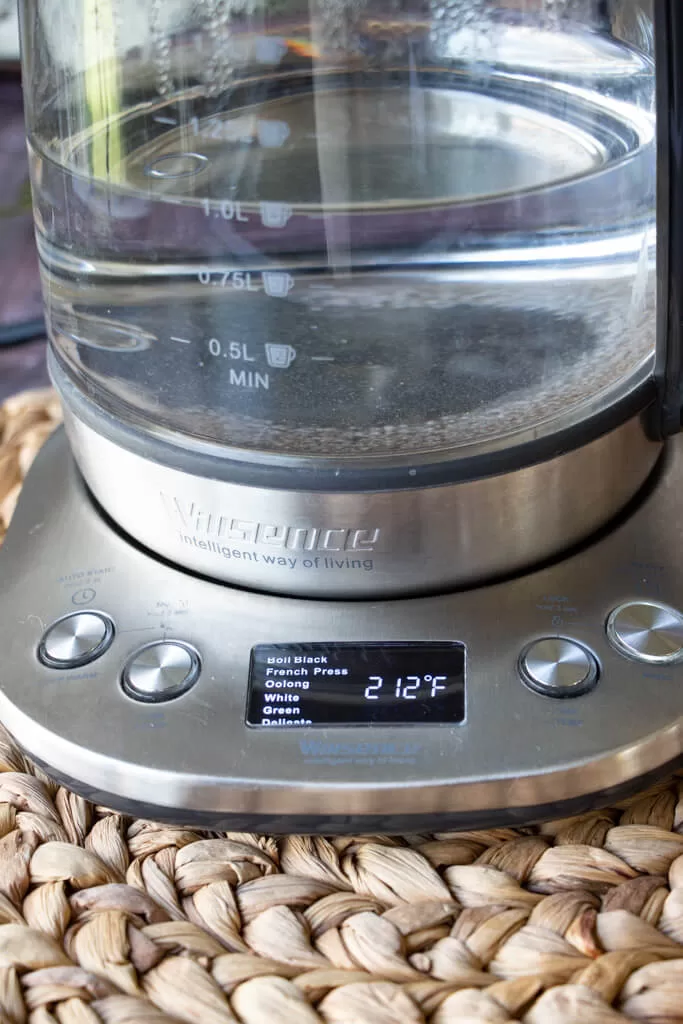



Dosage
It is recommended to consume no more than 3 cups of this herbal tea per day. Overconsumption of certain herbs can cause side effects, and it is important to follow the recommended dosage and consult with a healthcare provider if you have any concerns.
For detailed information on child dosage, check out this post on safe and effective herbs for kids.
Caffeine content – This herbal tea blend does not contain any caffeine, which makes it a great option for individuals who are sensitive to caffeine or who are looking for a caffeine-free alternative to traditional teas.
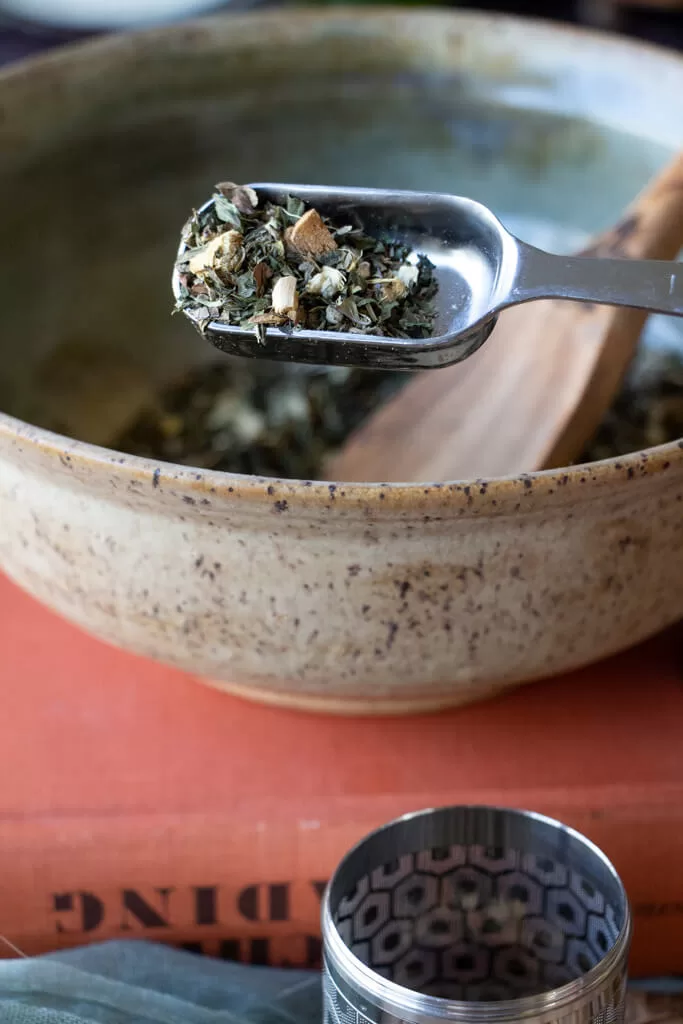
Storage
The tea blend can be stored in an airtight container in a cool, dry place for up to six months to maintain maximum freshness. It is important to store the tea away from direct sunlight, as exposure to light can cause the herbs to lose their potency.
Allergy Tea Herbal Benefits
Nettle
Nettle (also known as stinging nettle) is a natural antihistamine that can help to reduce the symptoms of allergies. It contains compounds that can stabilize the production of histamine, which is the chemical responsible for causing many allergy symptoms, such as sneezing, itching, and watery eyes. Nettle is also a natural anti-inflammatory, which can help to reduce swelling and inflammation in the nasal passages and airways.
Licorice
Licorice has natural anti-inflammatory properties and has been used for centuries to help soothe respiratory problems, including coughs, colds, and allergies. It contains compounds that can help to reduce inflammation and irritation in the airways, which can make breathing easier. Licorice also has a sweet taste, which can help to mask the bitterness of other herbs in the tea blend.
Mullein
Mullein is another herb that has been used for centuries to help soothe the upper respiratory system. It contains compounds that can help to reduce inflammation and irritation in the airways, which can make breathing easier. Mullein also has a mild sedative effect, which can help to calm the body during an allergic reaction.
Red Clover
Red clover has natural antihistamine properties that can help to reduce the symptoms of allergies. It also contains compounds that can block the production of histamine to ease common allergy symptoms. Red clover also has a mild diuretic effect, which can help to reduce congestion and promote the elimination of toxins from the body.
PepperminT
Peppermint is a natural decongestant that can help to relieve congestion in the nasal passages and airways. It contains compounds that can help to open up the airways, which can make breathing easier. Peppermint also has a refreshing taste and aroma, which can help to soothe the senses and promote relaxation (and makes the tea taste better!).
ginger
Ginger is a natural anti-inflammatory that can help to reduce inflammation and irritation in the airways. It also has a warming effect, which can help to promote circulation and kick the body into gear. Ginger can also help to calm the stomach and reduce nausea, which is sometimes associated with allergies.

While herbs are a gentle way to ease your symptoms and heal the body, they may still have side effects (though, far fewer side effects than over-the-counter medications to treat allergies). Herbal medicine is MEDICINE and should always be treated as such.
Allergy sufferers, I truly hope this home remedy helps your seasonal allergy symptoms. My husband gets BAD seasonal allergies and told me this really helped. If you make the tea, snap a pic and tag me on Instagram!
Healing Herbal Teas with The Homestead Challenge
This post is part of a series about herbal tea blends for common ailments. Check out the posts below!
- How to Brew Herbal Tea: Infusions and Decoctions
- Cold and Flu Tea
- Marshmallow Root Tea
- Nausea Tea
- Anxiety Tea
- Energy Tea
- Headache Tea
- Hangover Tea
- Mugwort Tea
Pin Herbal Allergy Tea Recipe for Later!


About the Author:
I’m Brittany, totally modern and mainstream turned crunchy mama!
Read more here about how I went from a totally incompetent cook and hyper-consumer to striving to live a more meaningful life from scratch.
I can’t wait to share my modern homesteading journey with you and I hope I inspire you to join along!

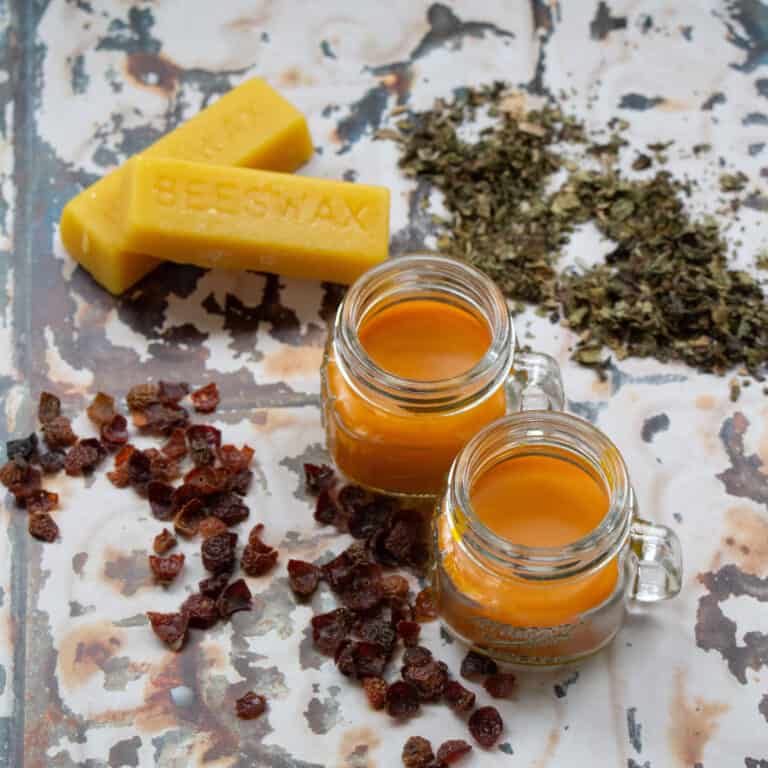
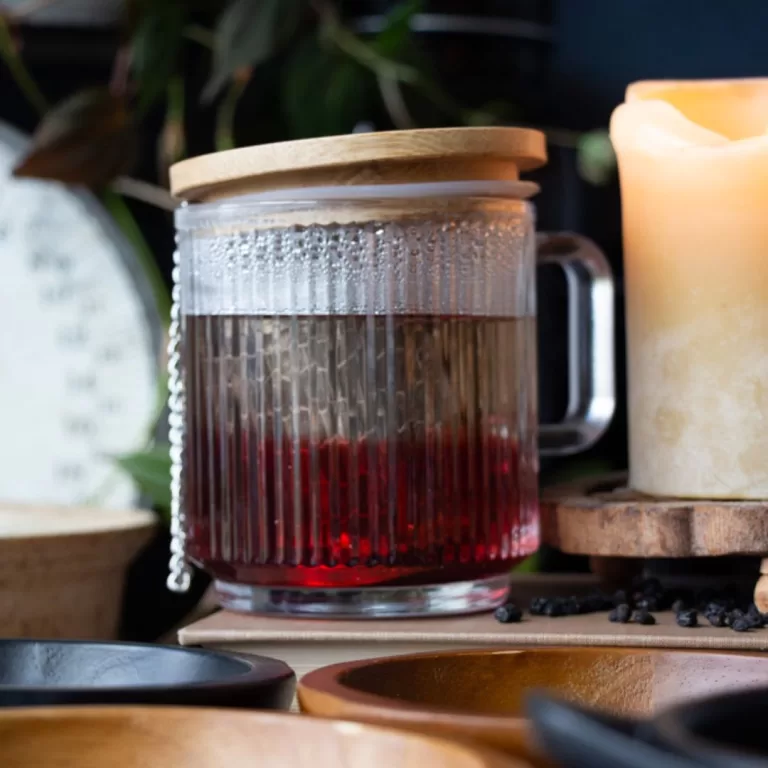
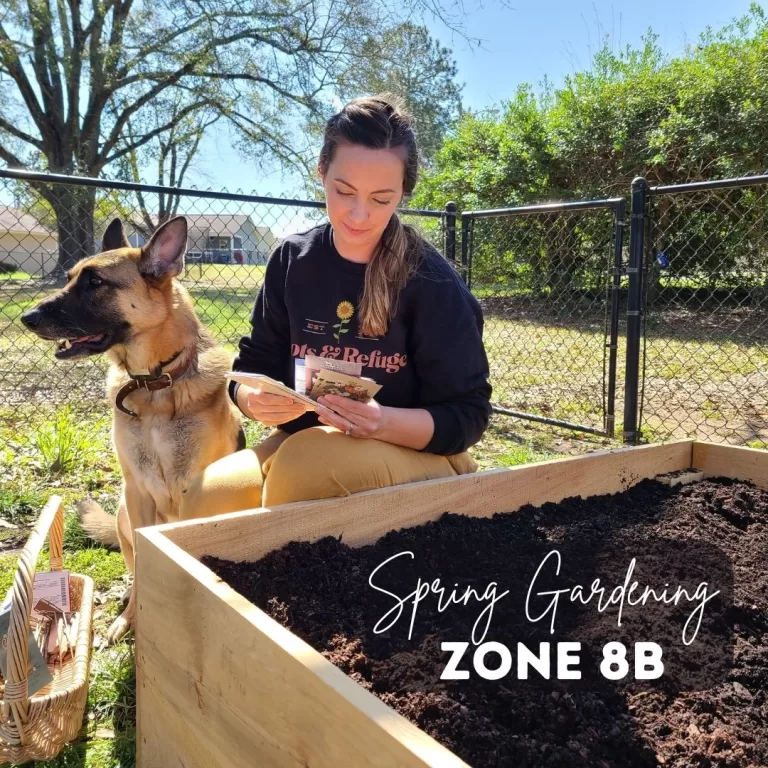
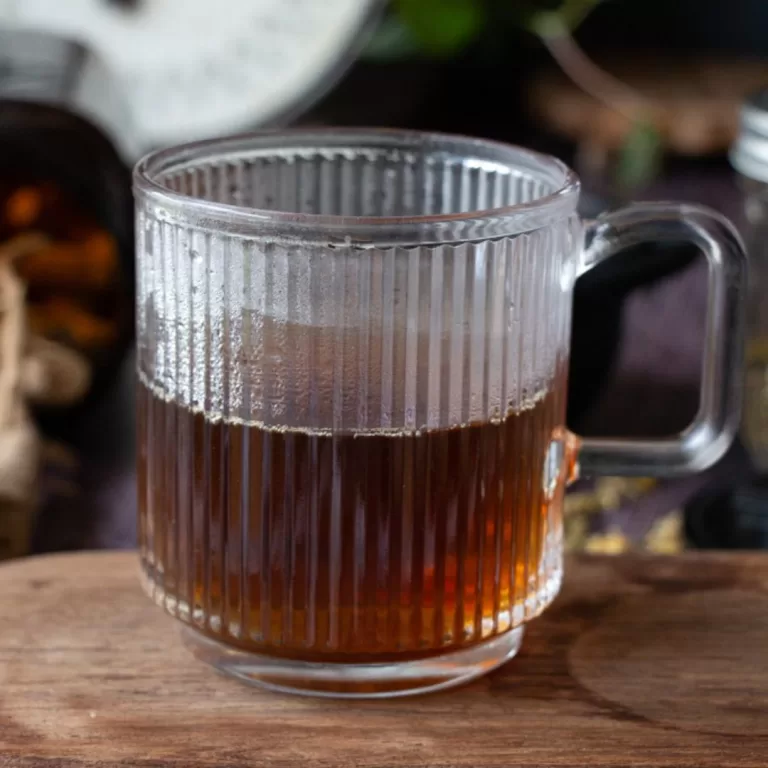


I like the recipe and your blog!
Beautiful article! I have seasonal allergies and will definitely be giving this recipe a try. I love tea so that’s a bonus. Thank you!
I love all these herbs and this recipe looks perfect for anyone suffering during allergy season!
I don’t know that I suffer from allergies, but I do love herbal tea and am always looking for fun healthy ways to mix them. Beautiful photos!